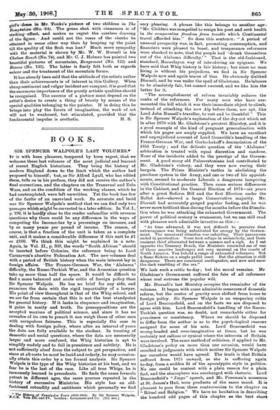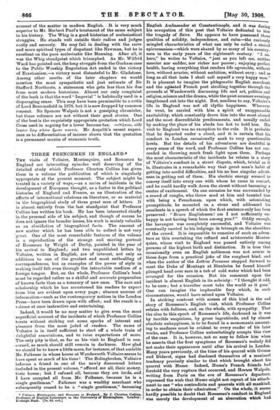BOOKS.
SIR- SPENCER WALPOLE'S LAST -VOLUMES.* IT is with keen pleasure, tempered by keen regret, that we welcome these last volumes of the most judicial and learned of recent English historians. They bring the history of modern England down to the limit which the author had proposed to himself; but, as Sir Alfred Lyall, who has edited them, tells ne in his preface, they did not receive the author's 4nal corrections, and the chapters on the Transvaal and Zulu Wars, and on the condition of the working classes, which he iiad contemplated, were left unwritten. Yet the book.has few of the faults of an unrevised work. So accurate and lucid was Sir Spencer Walpole's method that we can find only two -passages which might be corrected in a later edition. In Vol. I:, p. 198, it is hardly clear to the reader unfamiliar with revenue 'questions why there could be any difference in the ways of computing the Income-tax by a percentage on incomes, and by so many pence per pound of income. The reason, of course, is that a fraction of the unit is taken as a complete u nit, and it makes a considerable difference if this unit be £1 or 2100. We think this might be explained in a note. Again, in 'Vol. IL, p. 338, the words "South African" should 'be inserted before Colonies, the reference being to Lord 'Carnarvon's abortive Federation Act. The new volumes deal with a period of British history when the main interest lay in foreign affairs. The Franco-German War, the ` Alabama ' -difficulty, the Russo-Turkish War, and the Armenian question take up more than half the space. It would be difficult to And a more balanced and acute critic of foreign policy than Sir Spencer Walpole. He has no brief for any side, and examines .the data with the rigid impartiality of a lawyer. His point of view throughout is that of the Whig school, and we are far from certain that this is not the best standpoint for general history. If it lacks in eloquence and imagination, it gains in sanity and trtith. Its presuppositions are the accepted maxims of political science, and since it has no crusades of its own to preach it can weigh those of other men with scrupulous fairness. This is especially the case in dealing with foreign policy, where after an interval of years the data, are fully available to the student. In treating of domestic and social questions, where the data are necessarily larger and more confused, the Whig historian is apt to 'simplify unduly and to fail in prescience and subtlety. He is not sufficiently aloof from the subject to get perspective, and since at all costs he must be lucid and orderly, he may occasion- ally attain this order by a too formal analysis. Sir Spencer Walpole is the type of the Whig historian at his best, and we fear he is the last of the race. Like all true Whigs, he is immensely learned in precedents. He finds the same formula potent in different ages, the same process repeated in the history of successive Ministries. His style has an old- fashioned rotundity and antithesis which personally we find * The nistorp of TwentHise Years (18501880). By Sir Spencer Walpole, Vols. DI. and IV. London: Longmann and Co. [21s, net.]
very pleasing. A phrase like this belongs to .another Sage.:
"Mr. Childers was compelled to resign his post and seek health in the comparative freedom from trouble which Continental travel. afforded him." So does this sentence: "A period of
unusual prosperity was, in fact, promoting consumption, and financiers were pleased to boast, and temperance reformers were shocked to note, that the people had drunk themselves out of the Alabama difficulty.'" That is the old-fashioned, standard, Macaulayan way of introducing an epigram. We
have said that Whig history is fair history; but since no man living is without his prejudices, we find in Sir Spencer
Walpole now and again traces of bias. He obviously disliked Disraeli, and he was under the spell of Gladstone. He labours to be absolutely fair, but cannot succeed, and we like him the better for it.
"The accomplishment of reform invariably reduces the ranks of the reformers. For many men who have sur- mounted the hill which it was their immediate object to climb, instead of attacking the new Alp before them, are apt, like
Lord John Russell's traveller, to rest and be thankful." This is Sir Spencer Walpole's explanation of the dry-rot which set in after 1870- with Mr. Gladstone's greatest Ministry, and it is
a good example of the kind of pregnant generalisation with which his pages are amply supplied. We have an excellent and unprejudiced account of Lord Granville's handling of the
Franco-German War, and Gortschakoff's denunciation of the 1856 Treaty ; and the delicate question of the 'Alabama' arbitration is treated with equal discretion and candour.
None of the incidents added to the prestige of the Govern- ment. A good many old Palmerstonians had contributed to Mr. Gladstone's victory, and they were now rueing their bargain. The Prime Minister's tactics in abolishing the purchase system in the Army, and one or two of his appoint- ments, seemed to moderate Liberals a dangerous tampering Veil Constitutional practice. Then came serious differences in the Cabinet, and the General Election of 1874—six years after a great Reform Bill and the first Election under the Ballot Act—showed a large Conservative majority. Mr.
Disraeli had accurately gauged popular feeling, and he was never more brilliant than during the months before the Dissolu- tion when he was attacking the exhausted Government. The power of political oratory-is evanescent, -but we can still read with pleasure such admirable invective as this :—
"As time advanced, it was not difficult to perceive that extravagance was being substituted for energy by the Govern- ment. The unnatural stimulus was subsiding. Their paroxysms ended in prostration. Some took refuge in melancholy, and their eminent chief alternated between a menace and a sigh. As I eat opposite the Treasury Bench, the Ministers reminded me of one of those massive landscapes not very unusual on the coasts of South America. You behold a range of exhausted volcanoes. Not a flame flickers on a single pallid crest. But the situation is still dangerous. There are occasional earthquakes, and now and anon the dark rumbling of the sea."
We laok such a critic to-day ; but the moral remains. Mr Gladstone's Government suffered the fate of all reformer' whose zeal outruns the popular will.
Mr. Disraeli's last Ministry occupies the remainder of the volumes. It began with some admirable measures of domestic reform, but the centre of gravity soon shifted from home to foreign policy. Sir Spencer Walpole is an unsparing critic: of Lord Beaconsfield, and on the facts we are disposed to agree with him. Lord Beaconsfield's handling of the Russo- Turkish question was, no doubt, not remarkable either for prescience or consistency. Where we should be disposed to differ from the author is as to the psychological reasons assigned for some of his acts. Lord Beaconsfield was wrong-headed and over-imaginative at times, but he was certainly not callous or cynical where the interests of Britain were involved. The same method of criticism, if applied to Mr.
Gladstone's policy on more than one occasion, would have resulted in judgments with which neither Sir Spencer Walpole nor ourselves would have agreed: The truth is that Britain suffered from 1875 onward, as she is suffering again to-day, from a sudden fit of the apocalyptic style in politics. No one could be content with a plain reason for a plain fact, and the atmosphere was surcharged with rhetoric. Lord Beaconsfield's "Jingo" speech, and Mr. Freeman's nonsense
at St. James's Hall, were products of the same mood. It is pleasant to pass from these controversies to the chapter on "Ritual and Religion." We have no hesitation in describing the hundred odd pages of this chapter as the beat shod
. account of the matter in modern English. It is very much .superior to Mr. Herbert Paul's treatment of the same subject in his history. The Whig is a good historian of ecclesiastical struggles. He. stands well outside their radius and judges coolly and securely. He way fail in dealing with the rarer and more spiritual types of disputant like Newman, but he is excellent on the pure ecclesiastic like Manning. After all, it was the Whig standpoint which triumphed. As Mr. Wilfrid Ward has pointed out, the long struggle from the Gorham case to the Public Worship Regulation Act ended in the victory of Erastianism,—a victory most distasteful to Mr. Gladstone. Among other merits, of the later chapters we would mention the most sympathetic and just estimate of Sir Stafford. Northcote, a statesman who gets less than his due from most modern historians. Almost our only complaint of the book is that the word " Imperial " is habitually used in a • disparaging sense. Thia may have been permissible to a critic . of Lord BeaConsfield in 1878, but it is now dropped by common consent. Sir Spencer Walpole is not a gossiping chronicler, but these volumes are not without their good stories. One of the best is the exquisitely appropriate quotation which Lord Cross used in arguing for a lower Income-tax.
rcrao-iv cicrre irVov wu iravrOs. Mr. Asquith's recent experi- ence as to differentiation of income shows that the quotation is a permanent maxim of economic truth.







































 Previous page
Previous page